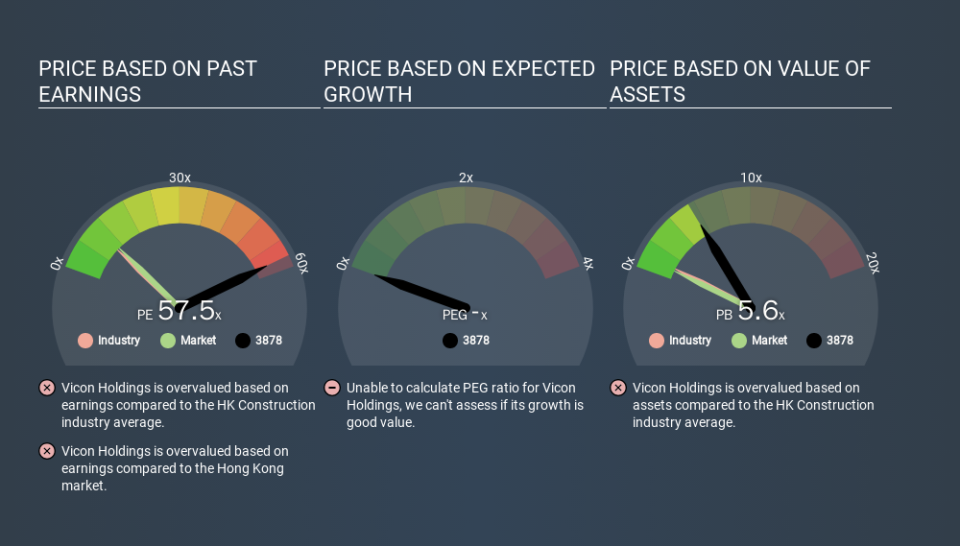How Does Vicon Holdings's (HKG:3878) P/E Compare To Its Industry, After Its Big Share Price Gain?

It's great to see Vicon Holdings (HKG:3878) shareholders have their patience rewarded with a 31% share price pop in the last month. Looking back a bit further, we're also happy to report the stock is up 94% in the last year.
Assuming no other changes, a sharply higher share price makes a stock less attractive to potential buyers. While the market sentiment towards a stock is very changeable, in the long run, the share price will tend to move in the same direction as earnings per share. The implication here is that deep value investors might steer clear when expectations of a company are too high. Perhaps the simplest way to get a read on investors' expectations of a business is to look at its Price to Earnings Ratio (PE Ratio). Investors have optimistic expectations of companies with higher P/E ratios, compared to companies with lower P/E ratios.
Check out our latest analysis for Vicon Holdings
Does Vicon Holdings Have A Relatively High Or Low P/E For Its Industry?
We can tell from its P/E ratio of 57.50 that there is some investor optimism about Vicon Holdings. As you can see below, Vicon Holdings has a much higher P/E than the average company (9.9) in the construction industry.
Vicon Holdings's P/E tells us that market participants think the company will perform better than its industry peers, going forward. Clearly the market expects growth, but it isn't guaranteed. So further research is always essential. I often monitor director buying and selling.
How Growth Rates Impact P/E Ratios
When earnings fall, the 'E' decreases, over time. Therefore, even if you pay a low multiple of earnings now, that multiple will become higher in the future. So while a stock may look cheap based on past earnings, it could be expensive based on future earnings.
Vicon Holdings had pretty flat EPS growth in the last year. And it has shrunk its earnings per share by 10% per year over the last three years. This growth rate might warrant a low P/E ratio. So you wouldn't expect a very high P/E.
Remember: P/E Ratios Don't Consider The Balance Sheet
The 'Price' in P/E reflects the market capitalization of the company. That means it doesn't take debt or cash into account. Hypothetically, a company could reduce its future P/E ratio by spending its cash (or taking on debt) to achieve higher earnings.
Such spending might be good or bad, overall, but the key point here is that you need to look at debt to understand the P/E ratio in context.
How Does Vicon Holdings's Debt Impact Its P/E Ratio?
Net debt totals just 5.6% of Vicon Holdings's market cap. So it doesn't have as many options as it would with net cash, but its debt would not have much of an impact on its P/E ratio.
The Bottom Line On Vicon Holdings's P/E Ratio
With a P/E ratio of 57.5, Vicon Holdings is expected to grow earnings very strongly in the years to come. With modest debt relative to its size, and modest earnings growth, the market is likely expecting sustained long-term growth, if not a near-term improvement. What is very clear is that the market has become significantly more optimistic about Vicon Holdings over the last month, with the P/E ratio rising from 43.9 back then to 57.5 today. If you like to buy stocks that have recently impressed the market, then this one might be a candidate; but if you prefer to invest when there is 'blood in the streets', then you may feel the opportunity has passed.
Investors have an opportunity when market expectations about a stock are wrong. People often underestimate remarkable growth -- so investors can make money when fast growth is not fully appreciated. We don't have analyst forecasts, but you might want to assess this data-rich visualization of earnings, revenue and cash flow.
You might be able to find a better buy than Vicon Holdings. If you want a selection of possible winners, check out this free list of interesting companies that trade on a P/E below 20 (but have proven they can grow earnings).
If you spot an error that warrants correction, please contact the editor at editorial-team@simplywallst.com. This article by Simply Wall St is general in nature. It does not constitute a recommendation to buy or sell any stock, and does not take account of your objectives, or your financial situation. Simply Wall St has no position in the stocks mentioned.
We aim to bring you long-term focused research analysis driven by fundamental data. Note that our analysis may not factor in the latest price-sensitive company announcements or qualitative material. Thank you for reading.


